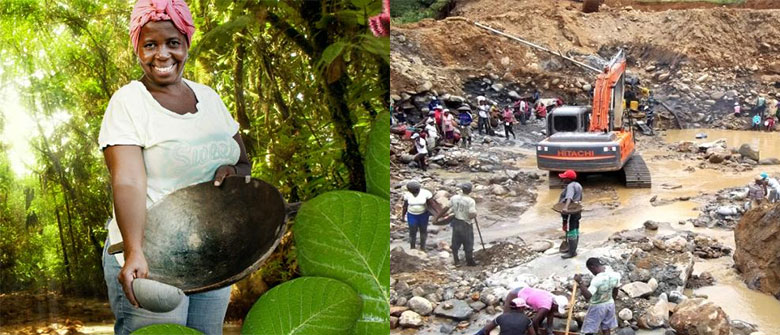Colombia’s mining minister has called for international regulation for gold similar to that imposed on the diamond trade to curb illegal mining in the country, according to US news network Bloomberg.
According to the United Nations’ commodity trade database, Colombia had reported it roughly exported 46.8 metric tons of gold with a value of more than $1.5 billion in 2016.
Colombia’s reported gold export
This gold trade, however, is virtually unregulated. Bloomberg even referred to “blood gold” as part of the informal gold industry is controlled by brutal illegal armed groups.
Less than 20% of Colombia’s gold mined illegally
The country’s mining association ACM said in December its member’ legal production accounts for less than 20% of the gold that is exported.
The remaining gold is extracted by informal mining enterprises, ancestral miners and, most problematically, illegal armed groups like the ELN or AGC.
80% of Colombia’s gold production either informal or illegal: mining association
Contradictory claims on mining titles have led to disputes between the government, informal miners, illegal armed groups, and legal mining companies.
While the production or revenue of the informal and artisanal miners is unknown, the “blood gold” revenue of illegal armed groups has become equal to or higher than drug trafficking.
In the first decade of the 21st century, two trends intersected: soaring gold prices greatly increased the profitability of gold mining, whilst the US led “War on Drugs”, notably in Colombia and Mexico (‘Plan Colombia’ and the ‘Mérida Initiative’), sharply reduced the profitability of drug trafficking from Latin America to the USA. As a result, there were considerable incentives for the criminal groups that control the drug trade to move into gold mining, and the fragmented nature of artisanal gold mining in Latin America greatly facilitated their entry.
Global Initiative against Transnational Organized Crime
According to Colombia’s Mining and Energy Minister, German Arce, the regulation of the international gold trade would deal a major blow to Colombia’s illegal armed groups and curb mass pollution, Bloomberg reported.
There’s a responsibility on the part of buyers to make certain what the origin of the gold is that they are acquiring.
Mining and Energy Minister German Arce
Arce diverted responsibility from the Colombian government itself, which has made a tremendous mess over the past decade. The government’s own failure to regulate the gold rush has left both mining companies and government officials implicated in “blood gold” investigations.
During the gold boom and subsequent gold rush, former President Alvaro Uribe granted 9% of Colombia’s national territory to legal mining companies, ignoring environmental regulations, ongoing mining activity by locals and links between legal mining companies, illegal armed groups and local elites.
In 2014, the country’s third largest gold exporter and ACM member, Goldex, reported the export of 30 tons of gold. One year later, its director was arrested for allegedly laundering $970 million for an associate illegal armed group also involved in drug trafficking.
The Prosecutor General’s Office is preparing to open new investigations, because there are indications part of the $970 million could have ended up financing political campaigns on local and regional levels.
Newspaper El Espectador
Leading Colombia gold trader arrested for money laundering
Multiple legal gold mining companies have been accused of having used similar death squads to displace local miners or other rural Colombians to obtain legal mining titles through corrupt government officials, a practice now known as “para-economics.”
The successor of Uribe, President Juan Manuel Santos, was ordered by the Constitutional Court last month to effectively “define policies” in regards to mining, taking into account both the environment, and the rights of artisan and small to medium-size companies seeking formalization.

Artisan miner (L) and illegal mining operation.
Last decade’s gold rush had apparently taken place without adequate legislation, while the government has often failed to recognize the distinction with ancestral mining and illegal mining.
Court orders Colombia to save river from mining. These images should show why
Weeks before, Canada-based gold mining company Gran Colombia Gold, said it would seek a $700 million compensation from the Colombian state — half the country’s last year’s gold export — after the company had lost a mining title to local artisan miners.
The miners that won the lawsuit were seeking the formalization of their activities for years, but claimed they had been stonewalled by the government. Again it took the Constitutional Court to settle the matter.
North Colombia gold mining towns shut down amid deadly dispute with Canadian multinational
Arce made no distinction between the mining carried out by illegal armed groups and miners who have failed to formalize their businesses or the artisan miners using ancestral practices.
“My fear is that there’s a lot of illegally-extracted gold that ends up in central bank vaults,” the minister was quoted as saying by Bloomberg.
Goldex was never accused of tax evasion, so a lot of the royalties paid over the exported “blood gold” has already ended up in either Colombia’s treasury or politicians’ pockets.




